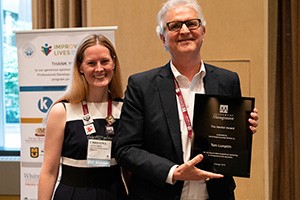Tom Lumpkin, director of the Tom Love Division of Entrepreneurship and Economic Development and C. S. Trosper Chair and Professor of Entrepreneurship at the Michael F. Price College of Business at the University of Oklahoma, recently received an international mentor award at the Academy of Management’s annual meeting. Lumpkin is shown with Christina Guenther, program chair at the Academy of Management.
Tom Lumpkin, director of the Tom Love Division of Entrepreneurship and Economic Development and C. S. Trosper Chair and Professor of Entrepreneurship at the Michael F. Price College of Business at the University of Oklahoma, recently received an international mentor award at the Academy of Management’s annual meeting.
The mentor award is given to an individual “who has provided exceptional mentoring in entrepreneurship education,” according to the Academy of Management Entrepreneurship Division’s website. Lumpkin’s award “recognizes exceptional mentoring activities at all educational levels in the field of entrepreneurship.”
“Professor Lumpkin is a prime example of how faculty at the Price College of Business work arm-in-arm with students every day to tackle the biggest issues of our time and prepare future business leaders to add value to their industries, and we couldn’t be prouder of his much-deserved recognition,” said Daniel Pullin, dean of the Price College of Business.
The Academy of Management is a professional association for management and organization scholars. Its 20,000 members are composed of professors and doctoral students in business schools at universities, academics in related social science and other fields, and “practitioners who value knowledge creation and application.” The Academy was founded in 1936 and its members span more than 120 countries.
“Mentoring is such an important part of higher education,” Lumpkin said. “More complex tasks require more nuanced and in-depth coaching and guidance to learn. I am humbled and honored to be recognized for mentorship by the Entrepreneurship Division of AOM and urge my colleagues to engage in and guard this important aspect of being a professor.”
Fifteen peer faculty members and students wrote letters of support for Lumpkin’s nomination for the award.
“One letter writer focused on four characteristics that [Lumpkin] embodies: exceptional generosity and selflessness, inspirational role modeling, nurturing professional and personal development and dedicated commitment,” said April Franco, associate professor of economic analysis and policy at the University of Toronto-Scarborough, who introduced the award to Lumpkin at the August meeting. “This mentor focuses on making sure to individualize the mentoring style to the mentee, which is pretty difficult.”
Lumpkin received additional recognition from the organization earlier in August, when he was named in the top 100 most influential strategy authors out of a total of 6,326 authors. The article, “A pluralist conceptualization of scholarly impact in management education: Students as stakeholders,” was published in August by Herman Aguinis, Ravi S. Ramani, Nawaf Alabduljader, James R. Bailey and Joowon Lee in the Academy of Management Learning and Education.
The article examines the most influential authors in organizational behavior, human resource management, strategic management and general management as cited in textbooks.
With more than 6,000 citations, Lumpkin placed in the top 1.6 percent most influential authors in the strategy category.
“In some ways, the more interesting finding is that those who are well-cited in textbooks are not necessarily well-cited in journal articles, but that ‘textbooks influence the knowledge base of very large numbers of students who are future practitioners,’” Lumpkin said, citing the article.
The authors further underscored the role of textbooks in management education.
“Overall, an important implication for practice of our empirical results is that performance management systems for faculty that include citations in journals exclusively as a criterion for evaluating performance are not necessarily assessing scholarly impact in management education,” the article’s authors stated. “We are aware that many faculty performance management systems include measures of teaching effectiveness in the form of student evaluations or peer class visits and assessments (Briggs, Workman, & York, 2013). But, to our knowledge, very few, if any, include measures of [knowledge transfer] in management education—as measured by the number of citations in textbooks.”
Lumpkin’s research and teaching interests include entrepreneurial orientation, social entrepreneurship and family business. He is a globally recognized scholar whose research has been published in such journals as the Academy of Management Review, Academy of Management Journal, Strategic Entrepreneurship Journal, Journal of Business Venturing and Entrepreneurship Theory and Practice. He was a co-editor of Strategic Entrepreneurship Journal for six years and serves on the editorial boards of five leading international journals.
Lumpkin is the 2009 recipient of the Foundational Paper award from the Entrepreneurship Division of the Academy of Management for a “classic and highly influential contribution to entrepreneurship research that serves as a legacy for scholarly work in the field” for his paper “Clarifying the Entrepreneurial Orientation Construct and Linking it to Performance,” published in 1996 (with Gregory G. Dess). A paper based on that research – “Entrepreneurial orientation and business performance: Assessment of past research and suggestions for the future” (with Andreas Rauch, Johan Wiklund and Michael Frese) – won the 2015 Greif Research Impact award at the Academy of Management. He received his doctoral degree in business administration from the University of Texas at Arlington and master of business administration degree from the University of Southern California. Prior to becoming a professor, he founded and operated two Virginia enterprises, served as assistant treasurer of the City of Fairfax, Virginia, and treasurer and business manager of Floyd Agricultural Energy Coop, a Virginia start-up.


